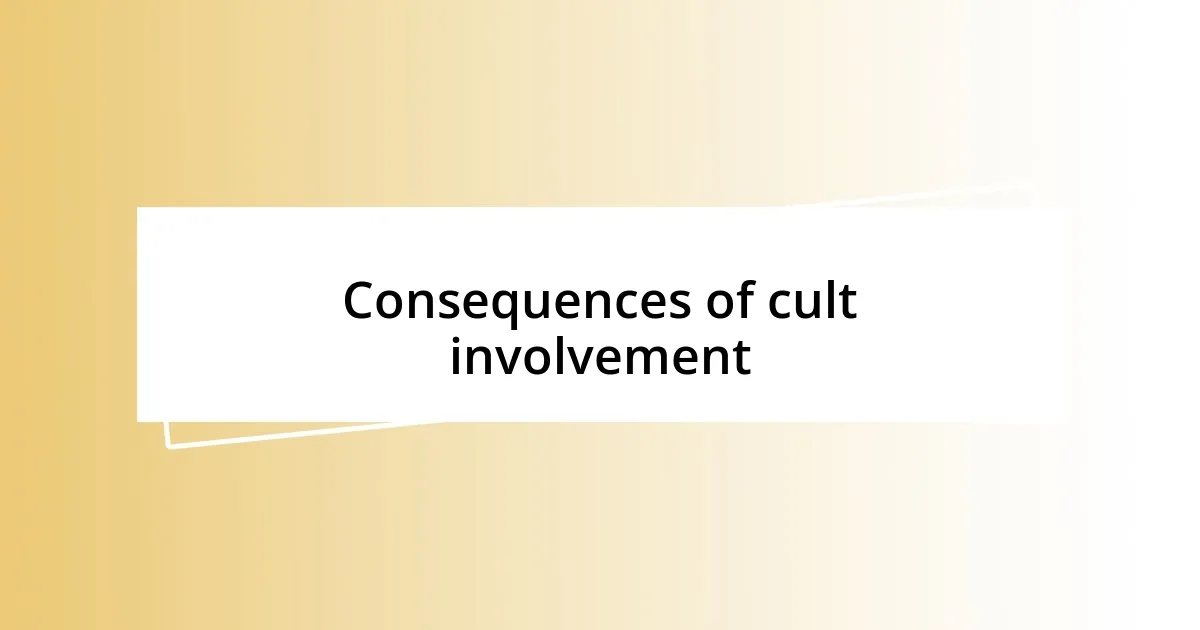Key takeaways:
- Cult followers often seek belonging and identity, finding comfort in shared beliefs amidst chaos.
- Charismatic leaders can exert strong influence, leading to blind loyalty and diminished critical thinking among followers.
- Common characteristics of cult members include a deep desire for connection, leader loyalty, and a tendency towards groupthink.
- Recovery from cult involvement can be challenging, requiring emotional support and practical assistance to rebuild lives.

Understanding cult followers
Understanding cult followers often requires looking beyond their external behaviors to explore their internal motivations. I remember attending a seminar where someone shared their experience of being involved with a cult. They spoke passionately about a sense of belonging that had filled a void in their life. Doesn’t it make you wonder what drives an individual to seek acceptance so desperately?
Many cult followers experience a profound transformation, finding identity and purpose that they may have struggled to achieve elsewhere. It’s fascinating to think about how the allure of a shared belief system can be incredibly comforting, especially in a chaotic world. Have you ever felt drawn to a community that provided a sense of security, even if only for a moment?
The allure of charismatic leaders can also play a significant role in their devotion. I once encountered a charismatic speaker who had a way of captivating the audience, making me ponder how easily one could fall under such influence. When a leader appears to have all the answers, followers might overlook warning signs or personal doubts, which raises the question: how do we distinguish between healthy admiration and blind devotion?

Psychological appeal of cults
The psychological appeal of cults often hinges on the deep-seated human need for connection and affirmation. I remember chatting with a friend who had once been involved in a group that provided emotional support during a pivotal moment in her life. She described it as a refuge, where every member was encouraged to share their vulnerabilities. This sense of belonging can be intoxicating, almost like being wrapped in a warm blanket on a cold day.
- A strong sense of community offers emotional safety.
- Followers often rely on shared experiences and fears.
- Cults frequently offer clear guidance during confusing times, answering existential questions.
- Emotional highs from group activities can enhance bonds between members.
- The desire for identity can lead individuals to align deeply with the group’s beliefs.
I’ve also observed the role of fear and uncertainty as powerful motivators. During a conversation with a former cult member, they mentioned that the world outside felt overwhelmingly chaotic, and the cult provided an illusion of control. This paradox—seeking refuge in a structured environment often led to surrendering personal autonomy—illustrates how psychological manipulation can thrive in a vulnerable state. It’s chilling to think about how easily one’s instinct for security can lead down such a convoluted path.

Common characteristics of cult members
Common characteristics of cult members often reveal layers of psychological complexity. From my observations, many followers share an intense desire for belonging, which can sometimes overshadow their critical thinking. I met a woman who described her initial involvement in a cult as a way to escape her feelings of isolation. She spoke of a seductive comfort that felt like home. It’s hard not to empathize with a person seeking what most of us crave: connection.
Moreover, cult members typically display a strong allegiance to their leaders, often viewing them as infallible. I’ve read about instances where followers would rationalize outrageous actions or statements made by their leaders, believing it to be a culmination of divine insight. This blind loyalty fascinates—and concerns—me. It makes me question: what boundaries do we set for our admiration of others?
Another notable characteristic is the tendency towards groupthink, where individual opinions become secondary to the consensus. I remember chatting with a former member who explained how the group would often stifle dissent, creating an echo chamber of beliefs. It’s compelling to consider how easily one can lose their sense of self in favor of a collective identity. How many of us have unknowingly succumbed to similar pressures in our lives?
| Characteristic | Description |
|---|---|
| Desire for Belonging | An intense need for connection that often leads to prioritizing group identity over individual thoughts. |
| Leader Loyalty | Blind allegiance to charismatic leaders, justifying their actions even in the face of clear contradictions. |
| Groupthink | A phenomenon where individual critical thinking diminishes in favor of collective agreement, suppressing dissenting opinions. |

Influence of charismatic leaders
I find it fascinating how charismatic leaders can draw followers into their orbit with seemingly effortless charm. I recall hearing a story about a group member who was initially skeptical but found herself mesmerized by the leader’s charisma during a casual gathering. The leader’s ability to articulate a vision that resonated deeply with her personal struggles played a pivotal role in her decision to stay. It’s remarkable how one person’s words can ripple through an entire community, fostering loyalty that often borders on obsession.
Charismatic leaders often exude a magnetic energy that captivates their followers, creating an almost cult-like devotion. I once spoke to someone who described how, during rallies, the leader’s passion electrified the atmosphere, making everyone feel invincible. It left me pondering: how does someone become so enraptured by another’s presence? This enthrallment can lead to an unquestioning allegiance that blinds individuals to the potential dangers of such power dynamics.
Additionally, the way these leaders cultivate an image of infallibility is both intriguing and unsettling. I’ve met individuals who professed to have witnessed the leader perform what they termed “miracles”—acts that seemed to elevate the leader to a divine status. This perception can cloud judgment, leaving followers captivated and unable to critically assess their situations. What’s terrifying is how easy it is to place someone on a pedestal, forgetting that they are, after all, just human. Isn’t it essential to question the motives behind such charisma?

Group dynamics within cults
Group dynamics in cults create an intriguing yet complex fabric of relationships. I’ve often marveled at how quickly individuals merge their identities into the group, almost like threads weaving into a tapestry. One former member shared with me that she felt an exhilarating sense of security in numbers, a feeling that ultimately eclipsed her own thoughts and desires.
Another striking aspect is the creation of rituals that reinforce group cohesion. I once attended a gathering where members performed a series of chants and dances, creating a shared experience that intensified their bond. It’s captivating to see how these shared moments can solidify beliefs and encourage conformity while subtly reinforcing the group’s ideology. Isn’t it compelling how participation in such rituals can blur the line between individual expression and collective identity?
Furthermore, the role of isolation cannot be overlooked in understanding these dynamics. I recall a conversation with a man who found himself estranged from his family as he became more entrenched in the group. This deliberate distancing from outside influences seemed almost like a lifeline to him, yet it suffocated his independent thinking. How often do we allow ourselves to be drawn into scenarios that isolate us from critical perspectives? It’s a thought-provoking reminder of the power of community—both its allure and its potential pitfalls.

Consequences of cult involvement
Consequences of cult involvement can be profound and often tragic. I once spoke with a young woman who had dedicated years of her life to a cult, only to emerge feeling utterly lost. She described the crushing realization that she had forfeited relationships with family and friends, leaving her to grapple with the loneliness that followed. Isn’t it harrowing to think how devotion to a group can cost individuals their very sense of belonging?
Financial implications are also significant. A former follower recounted how she donated her savings, believing it was for a greater cause. While she was promised enlightenment and a better life, she ended up struggling to make ends meet. This made me wonder: how do we decide what’s worth our time and resources? It’s a chilling reminder of the blind trust that often accompanies such deep involvement in cults.
Psychologically, the scars of cult involvement can linger long after individuals leave. I had a friend who sought therapy after leaving a cult, grappling with feelings of guilt and confusion for wanting to reclaim her identity. The psychological manipulation she experienced left an indelible mark, illustrating that the battle for recovery can be just as daunting as the initial entrapment. Have we considered the emotional toll this can take on those who once believed unwaveringly in a community? This emotional aftermath is often overlooked, yet it deserves our compassion and attention.

Ways to support cult escapees
Providing support for cult escapees requires a thoughtful approach, as each individual’s journey is uniquely complex. I remember meeting a former member who was overwhelmed by daily life after leaving her cult. Just a simple invitation to coffee gave her a sense of normalcy and a glimpse into the outside world, reminding me how crucial it is to offer companionship. Sometimes, it’s the small gestures that create a sense of belonging.
Listening plays a vital role in the healing process. I once found myself in a deep conversation with an escapee who shared her intense feelings of confusion and loss. By simply being present and actively listening, I learned the power of validating her experiences. It’s essential to create a safe space that encourages open dialogue, allowing space for their emotions without judgment.
Practical assistance can also be a game-changer. I’ll never forget how one escapee shared her anxiety about re-entering the job market. Offering to help her update her resume or practice interview skills not only empowered her but also helped rebuild her confidence step by step. This support underscores the importance of tangible assistance—what skills can you share to help someone regain their footing? Taking these actions can significantly impact someone’s transition to a more independent life.








